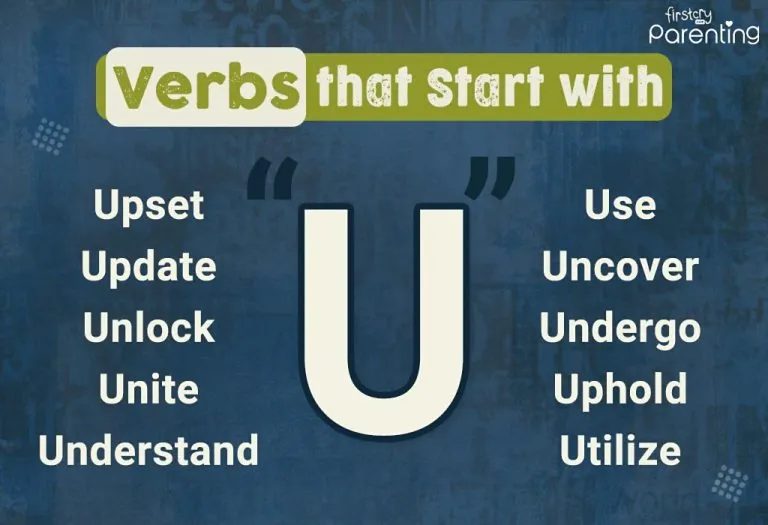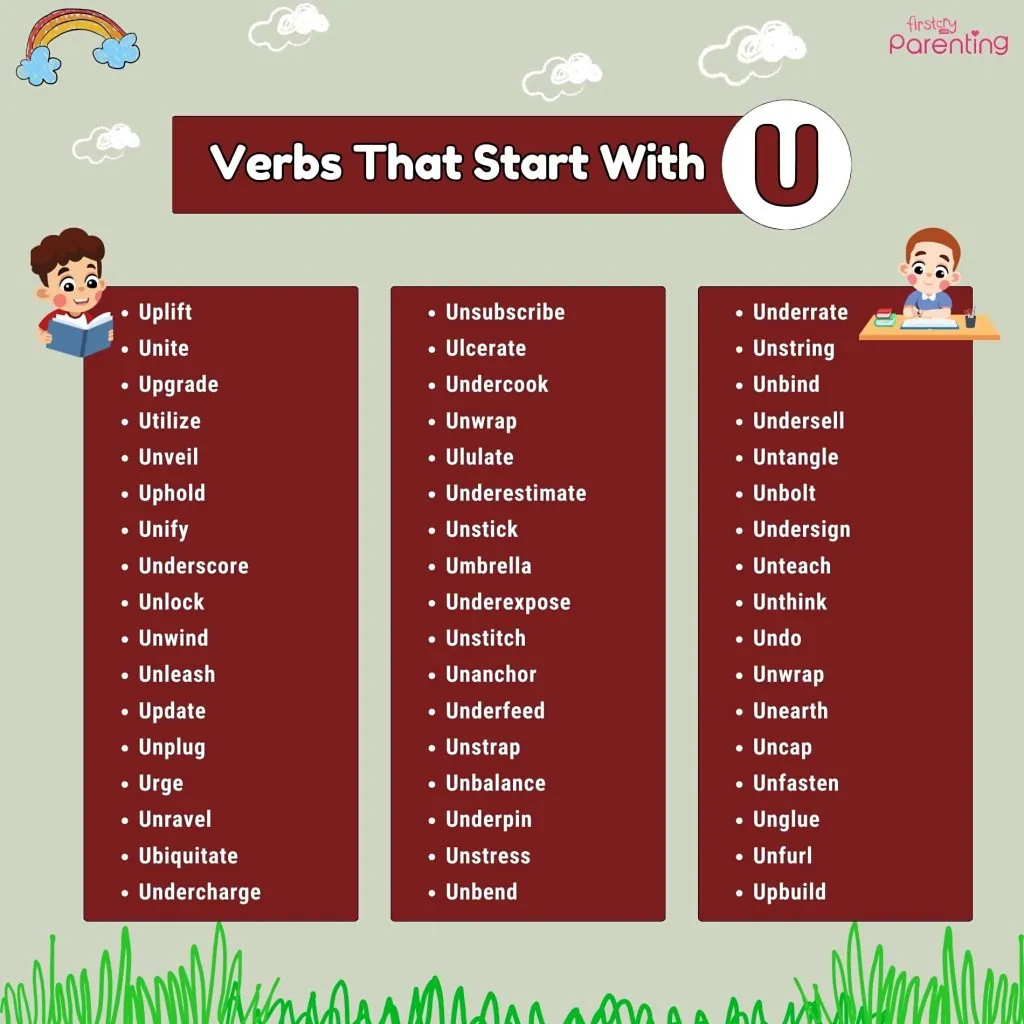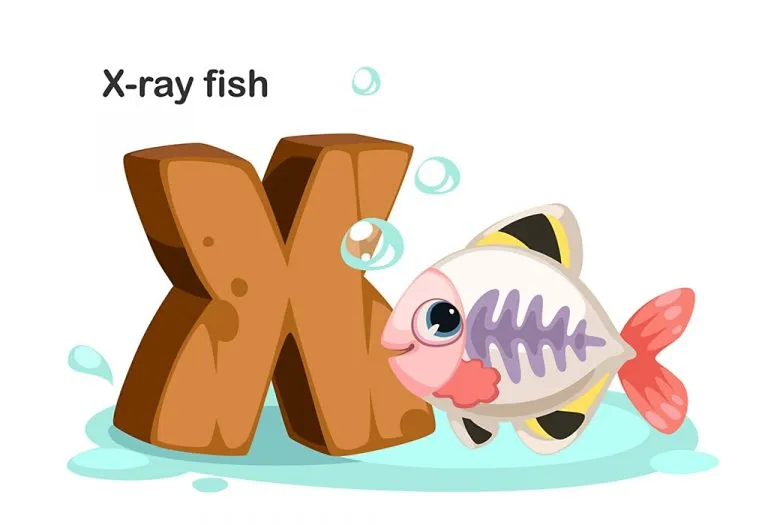Verbs That Start With U in English (With Meanings & Examples)
Verbs are the action words that bring life to our conversations and stories. Among these, verbs that start with the letter U offer a unique vocabulary for kids. Verbs that start with u for preschoolers and kids bring light to the action performed. Many verbs starting with the letter U feature the prefix ‘un,’ which means ‘not’ and serves to negate the word’s meaning. While there are some exceptions, the majority of U-initial verbs owe their form to this prefix, facilitating their identification as verbs. In this warm and engaging guide, we will explore a collection of ‘U’ verbs, tailored specifically for our curious young minds. Let’s dive into the vibrant universe of verbs that start with U for preschoolers and kids to express themselves with confidence and creativity.
What Are the Verbs Beginning With U?
English verbs starting with U encompass a diverse range of actions, states, and occurrences, enriching our language with versatility. These verbs with U offer a unique palette for expression, allowing speakers and writers to convey actions with understanding. Many verbs starting with the letter U are prefixed with ‘un,’ denoting a negation or opposite meaning. Whether crafting sentences for storytelling or engaging in daily conversations, adding these ‘U’ verbs to vocabulary will help you communicate your thoughts more effectively.
Common Verbs Starting With U
Start your journey with the basic verbs starting with U that are both common and incredibly useful in our daily communication. Each verb starts with letter U offer unique opportunities to bring a thought to life. Here, we’ll dive into 15 verbs that begin with the letter ‘U’, with their meanings and sample sentences.
1. Use – To employ for some purpose; to utilise
Example: She decided to use her savings to buy a new bicycle.
2. Understand – To grasp the meaning, significance, or nature of something
Example: He quickly understood the rules of the game.
3. Undertake – To commit oneself to and begin (an enterprise or responsibility); to take on
Example: The team decided to undertake a challenging new project.
4. Update – To make something more modern or suitable for use now by adding new information or changing its design
Example: The software needs to be updated to the latest version.
5. Urge – To strongly advise or try to persuade someone to do a particular thing
Example: She urged her friend to apply for the job.
6. Unite – To join together for a common purpose or action; to merge
Example: The two companies decided to unite to increase their market share.
7. Uncover – To remove a cover or covering from; to reveal something hidden
Example: The archaeologist was excited to uncover an ancient artefact.
8. Undergo – To experience or be subjected to something, typically something unpleasant or arduous
Example: The patient had to undergo surgery to remove the tumour.
9. Uphold – To maintain or support in the face of possible opposition
Example: The court decided to uphold the original decision.
10. Upset – To disturb the mental or emotional equilibrium of; to disturb physically
Example: The bad news upset her greatly.
11. Utilise – To make use of
Example: The engineer utilised the latest technology to complete the project.
12. Unravel – To untangle or solve a problem or complex situation
Example: Detective Smith worked hard to unravel the mystery.
13. Unlock – To open (something) by means of a key, combination, etc.; to allow access to
Example: The key was finally found to unlock the old chest.
14. Unleash – To release from a restraint; to let loose
Example: The company decided to unleash a new wave of innovative products.
15. Untie – To open or unfasten something
Example: She knows a trick to untie the shoe laces super fast.
By incorporating these verbs with U into your language, you can enhance your ability to share ideas, feelings, and actions more easily. Each verb starting with ‘U’ carries its unique shade of meaning, enriching our English vocabulary and enabling more nuanced and expressive communication.
Action Verbs That Start With U
Action verbs that start with the letter U are dynamic words that denote activities, events, and processes, pushing forward the sentences into motion. By integrating these verbs into our vocabulary, we can describe activities and events with greater precision. In this section, we’ll explore 15 action verbs starting with the letter U, their definitions, and example sentences to showcase how they can be applied in context.
1. Unfold – To reveal or disclose (thoughts or information) gradually or bit by bit
Example: The plot of the novel begins to unfold in the second chapter.
2. Update – To make (something) more current by adding new information or making corrections
Example: She updated her resume with her most recent job experience.
3. Upgrade – To raise (something) to a higher standard, in particular, improve (equipment or machinery) by adding or replacing components
Example: The company decided to upgrade their computer systems.
4. Uplift – To raise (something) to a higher position; to elevate spiritually or morally
Example: The motivational speaker aimed to uplift the audience’s spirits.
5. Urge – To encourage someone strongly to do something or to persuade forcefully
Example: He urged his team to push through the final stages of the project.
6. Utilise – To make practical and effective use of something
Example: The architect utilised space efficiently in the design.
7. Unleash – To release a force, emotion, etc., suddenly and powerfully
Example: The announcement unleashed a wave of excitement among the fans.
8. Unite – To join together politically, for a common purpose, or by common feelings
Example: The community leaders called to unite in support of the new initiative.
9. Unravel – To solve (something complicated or puzzling) to untangle
Example: They worked tirelessly to unravel the complex coding issue.
10. Undermine – To weaken or damage (someone or something), especially gradually or insidiously
Example: The constant criticism began to undermine his confidence.
11. Undertake – To commit oneself to and begin (an activity or task)
Example: She undertook the responsibility of organising the charity event.
12. Undercut – To offer goods or services at a lower price than (a competitor)
Example: The new store aimed to undercut the prices of its competitors.
13. Underestimate – To estimate (something) to be smaller or less important than it actually is
Example: Never underestimate the power of a kind word.
14. Unpack – to open something or remove the content of something, such as luggage, bag, etc.
Example: Let’s quickly unpack the luggage so that we can have dinner.
15. Underwrite – To sign and accept liability under (an insurance policy), thus guaranteeing payment in case loss or damage occurs
Example: The insurance company agreed to underwrite the new policy for the building.
Positive Verbs That Start With U
Positive verbs that start with ‘U’ are uplifting words that contribute a constructive and affirmative tone to our dialogues and narratives. These verbs are powerful tools for encouraging optimism, action, and positivity. Here are top 15 positive verbs starting with U with meanings and sample sentences, each providing a meaningful way to express actions that have beneficial outcomes or intentions. Through these examples, we’ll see how incorporating positive verbs into our language can inspire and motivate, creating a more encouraging atmosphere in both personal and professional contexts.
1. Uplift – To inspire or make someone feel happier or more hopeful
Example: The teacher’s kind words uplifted the student’s spirits.
2. Unite – To bring together for a common purpose or action; to join in solidarity
Example: The community united to support the local food bank.
3. Upgrade – To improve something or increase its value
Example: Investing in new software will upgrade our workflow efficiency.
4. Utilise – To use something effectively for a beneficial purpose
Example: The NGO utilised donations to provide relief to the affected areas.
5. Unveil – To reveal or disclose something new or previously hidden
Example: The artist unveiled her latest masterpiece at the gallery.
6. Uphold – To support or maintain moral principles or laws
Example: The judge swore to uphold justice in all cases.
7. Unify – To make or become united, uniform, or whole
Example: The leader’s vision helped to unify the divided community.
8. Underscore – To emphasize or underline something
Example: The CEO underscored the importance of teamwork in the meeting.
9. Unlock – To open up new possibilities or access to something valuable
Example: Learning a new language can unlock opportunities for travel and work.
10. Unwind – To relax or reduce stress
Example: After a long week, she liked to unwind by reading a book.
11. Unleash – To release a powerful force or potential
Example: The new policy unleashed a wave of entrepreneurial initiatives.
12. Update – To provide the latest information or changes to something
Example: Regularly updating the team keeps everyone informed and engaged.
13. Unplug – to detach something or yourself from something or an emotion
Example: It’s time to plan and vacation for some place peaceful and unplug ourselves from the fast life.
14. Urge – To encourage someone passionately to do something positive
Example: He urged his friends to participate in the charity run.
15. Unravel – To solve or clarify a complex situation, leading to a positive outcome
Example: Together, they managed to unravel the misunderstanding and restore peace.
Incorporating these positive verbs into our vocabulary enables us to convey actions that inspire, motivate, and bring about positive change. By emphasizing the constructive aspects of our actions and intentions, we foster an environment of optimism and encouragement, making our interactions more meaningful and impactful.
More Verbs That Begin With U
In addition to the verbs explored in the previous sections, the English language is rich with a variety of verbs that begin with the letter U. These verbs encompass a wide range of actions, emotions, and processes. In this section, we present an additional collection of 50 verbs starting with U to expand further your ability to express yourself clearly and effectively.
| Verb | ||
| Ubiquitate | Undercharge | Unsubscribe |
| Ulcerate | Undercook | Unsheathe |
| Ululate | Underestimate | Unstick |
| Umbrella | Underexpose | Unstitch |
| Unanchor | Underfeed | Unstrap |
| Unbalance | Underpin | Unstress |
| Unbend | Underrate | Unstring |
| Unbind | Undersell | Untangle |
| Unbolt | Undersign | Unteach |
| Unbosom | Undertax | Unthink |
| Unbrace | Underuse | Undo |
| Unbraid | Underwhelm | Unveil |
| Unbuild | Unearth | Unwrap |
| Uncap | Unfasten | Upbuild |
| Uncase | Unfetter | Upchuck |
| Unchain | Unfurl | Upholster |
| Unclasp | Unglue | |
FAQs
1. Why is it important to learn verbs that start with U?
Learning verbs that start with ‘U’ is important because it broadens your vocabulary, allowing for more precise and varied expression in both spoken and written English.
2. Can verbs starting with U be used in all tenses?
Yes, verbs starting with U can be adapted to various tenses, enabling you to accurately describe actions or states in the past, present, and future.
These verbs, ranging from actions to states of being, will enrich your vocabulary to articulate thoughts and emotions with greater clarity and nuance. Embracing the diversity of these verbs not only enhances your linguistic skills but also deepens your engagement with the vibrant world of the English language and literature.
Also Read: Verbs That Start With A to Z
| A | B | C | D | E | F | G | H | I | J | K | L | M |
| N | O | P | Q | R | S | T | U | V | W | X | Y | Z |
Was This Article Helpful?
Parenting is a huge responsibility, for you as a caregiver, but also for us as a parenting content platform. We understand that and take our responsibility of creating credible content seriously. FirstCry Parenting articles are written and published only after extensive research using factually sound references to deliver quality content that is accurate, validated by experts, and completely reliable. To understand how we go about creating content that is credible, read our editorial policy here.














.svg)
















